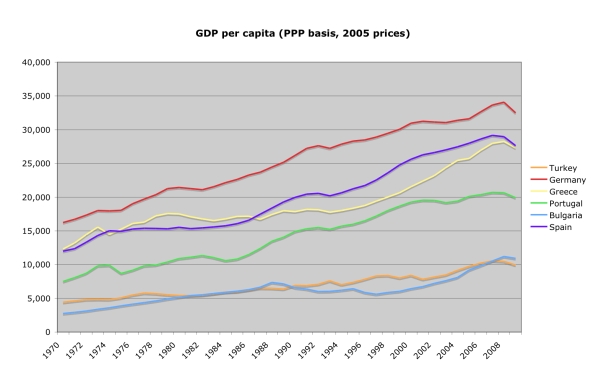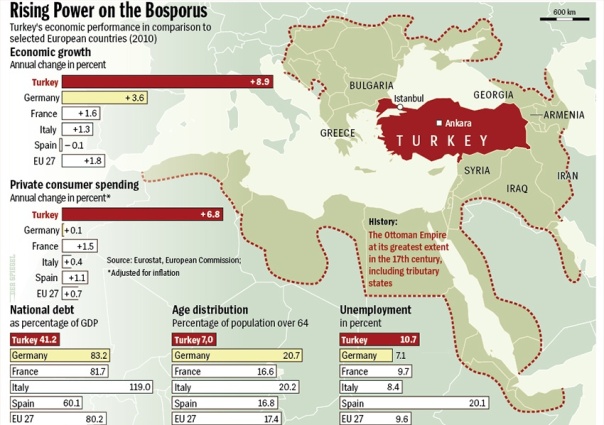Earlier this month the German magazine Der Spiegel published a brace of articles about Turkey and accompanied them with a graphic comparing Turkey’s economy and those of a number of EU member states. A cursory glance at this graphic, which I’ve reproduced below, suggests clearly that this is Turkey’s hour. Far from being the economic basket-case of old, it would appear that a youthful Turkey is surging ahead of an ageing, debt-ridden and generally sclerotic EU.
Would that it were so simple. But it isn’t. The numbers in Der Spiegel’s graphic present the most superficial of comparisons between Turkey’s economy and those of its neighbours to the west. Take the comparison of GDP growth figures. While GDP growth is a crucial number, in isolation it is a poor barometer of a country’s overall economic standing.
For one thing, on its own it tells us nothing about the size or composition of the economy doing the growing. Less developed economies frequently enjoy periods of rapid GDP growth, because they have so much scope for improvement and so much best practice to borrow from others. Similarly, for more highly developed economies each extra unit of additional GDP is that much harder to eke out because the low-hanging fruit have long since been picked.
So when we look at the Der Spiegel graphic and see that Germany’s economy grew at significantly less than half the pace of Turkey’s in 2010, we shouldn’t jump to any simplistic conclusions. Turkey’s economy isn’t twice as strong as Germany’s, or twice as resilient, or twice as productive. Despite its much lower growth rate in 2010, it remains an obvious fact that Germany has a much larger and more advanced economy than Turkey, that it can produce goods and services of much higher value than Turkey, and that it can thereby deliver its citizens a correspondingly higher level of material well-being than Turkish citizens enjoy.
The counter-argument one often encounters at this point suggests that it’s only a matter of time before Turkey catches up. The European Union is tired and on the wane while Turkey, with its young population, is only getting into its stride. But this, for the moment, is hubris. Yes, Turkey’s population is large and young. But it is also very poorly educated. It will struggle to make the transition into the kinds of higher-value economic activity that will ultimately be needed if Turkey is to sustain strong rates of economic expansion.
*****
Economists refer to the existence of a ‘middle-income trap’ which sees countries’ economic growth slow once they move from being a developing economy to one that needs to innovate for itself. We can tentatively identify where this middle-income trap lies. According to research published earlier this year by Barry Eichengreen and others for the National Bureau of Economic Research in the US, periods of rapid catch-up by poorer economies tend to bump up against this wall when per capita GDP—that is, GDP divided by the size of the population—reaches $16,470. At this point, the research claims, average growth drops from 5.6 per cent to 2.1 per cent.
Where does Turkey stand relative to this figure? The chart below plots the levels of per capita GDP in Turkey and five EU member states from 1970 to 2009.
 (Source: Penn World Table Version 7.0)
(Source: Penn World Table Version 7.0)
The comparison between Turkey and Germany suggested in the Der Spiegel graphic appears remote when we look at this second chart. In 2009, Turkey’s per capita GDP in 2009 stood at $9,910. Germany’s by contrast was more than three times higher at $32,487. But not only does Turkey have a vast distance to travel before it would reach current German levels of economic development, it even has a significant way to go before it gets to Mr Eichengreen’s $16,470 middle-income trap, when we can expect growth to become more difficult to sustain.
None of this is to say that Turkey’s current economic performance isn’t impressive. It is. But we shouldn’t get carried away. I have noted in a previous post that there are immediate vulnerabilities in the form of a yawning current account deficit. But the chart above coupled with this idea of the middle-income trap points to a longer term cause for circumspection. There is no inevitability about Turkey remaining on a steeply upwards economic trajectory that will see its economy converge any time soon with those of its EU counterparts.

Hello,
I want to criticize your comment “Yes, Turkey’s population is large and young. But it is also very poorly educated.” and “In 2009, Turkey’s per capita GDP in 2009 stood at $9,910. Germany’s by contrast was more than three times higher at $32,487. But not only does Turkey have a vast distance to travel before it would reach current German levels of economic development,[..]”
I am 21 years old, I am studying in Turkey and currently I am doing an internship at Germany for two months now, so I had time to experience both the cultures and economies. I must tell you that you are correct; German’s are a much more industrious and disciplined people. Assuming you are older than 30 years old please let me accuse you of being old-fashioned.
In 20th century when you talked about education you were referring to an overall state of being, you were talking about knowledge. In today’s world I do not even need to spell knowledge to be successful nor educated. Thanks to modernization everything is changing faster than it used to. So I believe today’s analysts are thinking in pre-21th century terms.
Right now to be successful you do need education and you are correct about that. However I believe the very concept of education has changed in our new century. Now anything is useful but discipline and knowledge thanks to Wikipedia and similar sources. Therefore I want to counter your accusation of Turkish students being poorly educated in the following way: Not long, only 5 years ago, knowledge and training was necessary to be successful at nearly every task. However today an everyday engineer is well-replaceable with an algorithm since all the necessary data can be found at internet. Therefore you do not need well educated nor disciplined people at work. You just need smart people that can solve small problems. With all my respects to the Western lifestyle and German discipline I can easily say that compered to you we, Turkish youth are like a Chameleon, as stated by Newsweek Turkey just 6 months ago. Due to our cultural norms and state-of-art lies we learn from our girl friends who can only lie to survive in such a place of Islamic-oppression, we developed a good short-term smartness, which would be only useful in short term just 5 years ago. But now I do not believe a slack-off with a smart mind is distinguishable from a well-educated Western, therefore I claim as a middle class we are as good as Germans.
However I do not belong to this group, I believe I belong to another group, which is of course more essentially needed for sustainable development. In 21th century discipline and knowledge are being replaced by talent and creativity. We can exemplify this in many ways, but I will just mention that the people I defined in last paragraph needs to be guided to slack-off in the right direction. And this direction can only be created by people with a vision. Our instructors at Physics Olympiads have told us that talented people correspond to some percent of the population, irrespective of race and gender. Assuming this approach I can claim that we will be a powerhouse in innovations and high-tech only in a few decades. If you have any doubts of the proportion of talented people which are supported and which are not supported I just wish to inform you that I am awarded 800€ per month by scholarships and the generosity of both Turkish government and NGO’s are unique in the world. Also if you have racist doubts about talent or innovation of Turkish people let me suggest you to check International Science Olympiads’ statistics and some weird Turkish entrepreneurs like, Drug King in The Netherlands or owner of Artemis in Berlin.
And finally about the GDP per capita I would like to inform you that purchasing power of $9,910 in Turkey is much grater than $32,487 in Germany. My home city and the city where I study are separated by 400 kilometers, and I can travel this distance in 5hours for only 12€ with a bus. And let me inform you that the bus is much more comfortable (with TV screens on every seat) than the ICE’s. In Germany it would cost at least 60€ to do such a trip.
I can continue like this forever but I believe I made my point clear.
Thank you very much